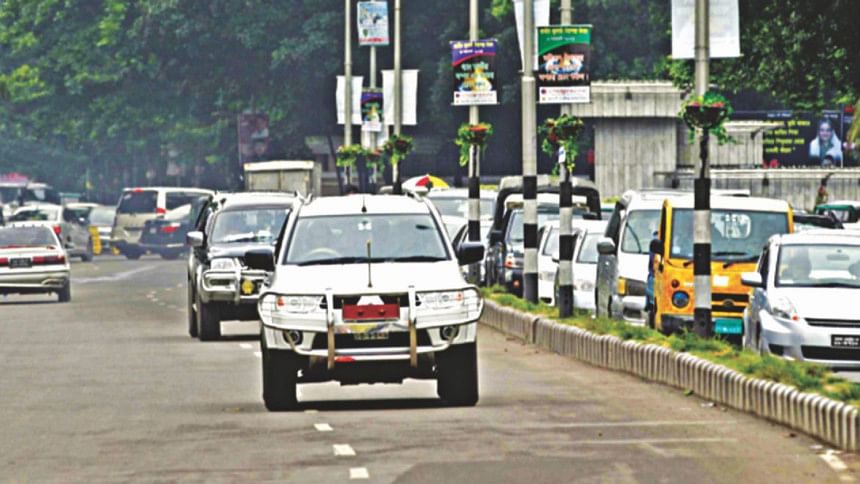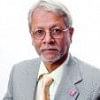On emergency (?) duty

They say in Italy you can get away with murder, not literally though, if you could bring out a bambino from somewhere. For one, I have not seen any country, not that I have visited all the plus two hundred, where children are as adored as in the land of godfathers. They simply go gaga at the sight of a child.
In England too you could perhaps get away unscathed for speeding if you could show your wife writhing in labour. Well, a child is obviously involved.
A baby, an incoming one, would do just as well in Bangladesh, but apparently there are other ways to woo the police into having your way or to keep them at bay. Some of the more common gate passes on the road include: My child has exams, I am late for a funeral, and omuk minister is waiting for me (he means he has a meeting with a minister, but a guy can be forgiven for faltering when confronted by our police).
On the side of nepotism there are statements (read threats) that the police have to succumb to with utmost caution and patience on a regular basis: my cousin is a ward commissioner, my uncle was a MP, my dad's friend is a minister, my dad may become a minister, etc.
Almost everyone in this country it seems is moving about with someone else's identity, fake or fact. That is because it probably works on most occasions. The number-one catchphrase at election rallies and in anniversary messages -- the people -- do not matter; they are usually harassed at every opportunity and delayed by successive inaction. That would not have been a grieving issue had not some other 'connected people' gotten away with crime or been granted an undue advantage or allowed to unduly jump the queue!
An ambulance should be allowed to pass through at all costs, but time and again we pity them while stuck at traffic jams or when trailing behind a slower vehicle despite the wailing of the siren. That is not without reason. We have systematically destroyed that compassionate convention too. During hartals, ambulances have been misused to ferry healthy persons in the guise of the almost dead. On normal days, they carry relatives, students, businesspeople and what not. No wonder then that the crucial tone of distress that ambulances blare have become, to the dread of a genuine case, a matter to be ignored and scoffed at.
In order to get some benefit on the road, some connected persons flash their porichoy on their vehicle. The trend goes back to hartal culture when some vehicles were exempted. And so we were introduced to "on emergency export duty", followed by "on emergency medicine supply duty", "water supply", "gas supply", "press" or "newspaper", "ministry", etc. that allowed anyone from a party reveller returning from a social club to someone travelling to meet his amoureux passage through pickets and worrisome neighbourhoods.
There is no hartal nowadays, but there are police check-posts and rounds on no-parking streets, as well as the occasional unforeseen localised hungama. Therefore, signs saying "lawyer" on the front of a car, or "sangbadik", or "doctor" are actually ways of getting by in case of any unprecedented situation, even if a paid driver is at the wheels. He is not the professional, so why the tag?
It is important to remember that every person's job is important to that person and to that person's near and dear ones. No one sweats to sell peanuts on the pavement for entertainment. No one is pulling a rickshaw with two guys on the backseat to build a six pack. A kid is treading to school through the busy city streets because the father cannot afford a rickshaw fare or the school a bus.
The vendor is in no less an emergency than the office-going executive. The student's future depends on his school results. He may have to pull a rickshaw after Class V and a few years more. An old mother will wait all day for Khoka, the rickshaw-puller, to return his rickshaw to the garage and bring her a cough syrup; by then the pharmacy may have shut. With every pedalling he thought of his ailing mother. You think you have an emergency?
You will have noticed that the flag-stand of a car is without a flag when the honourable member of the cabinet or others so privileged is not travelling on it. There is a very good reason for that law. Likewise, the doctor, the lawyer and the journalist should only display such identification when the incumbent is in the vehicle. That makes sense.
Only vehicles belonging to police, fire service and ambulances should have the right of way when on duty. The siren should not be howling when the service people are returning to base or going home. If every situation is treated as an emergency by service personnel who are on emergency employment and by those who are not, then a real crisis risks being not treated as an emergency; not that we have not already reached that alarming situation.
The writer is a practising Architect at BashaBari Ltd., a Commonwealth Scholar and a Fellow, a Baden-Powell Fellow Scout Leader, and a Major Donor Rotarian

 For all latest news, follow The Daily Star's Google News channel.
For all latest news, follow The Daily Star's Google News channel. 



Comments